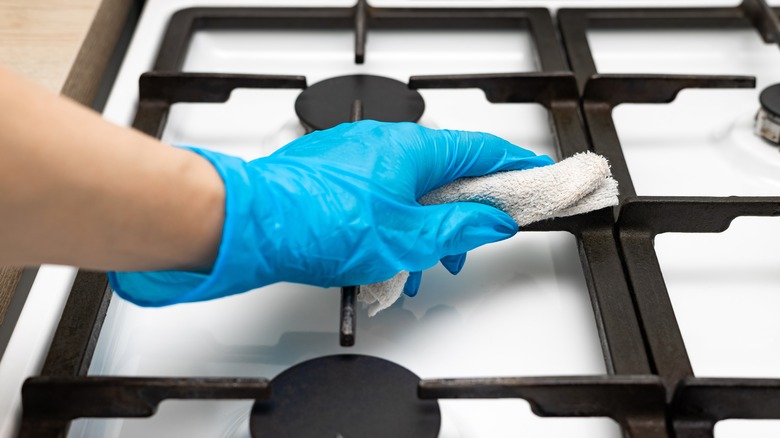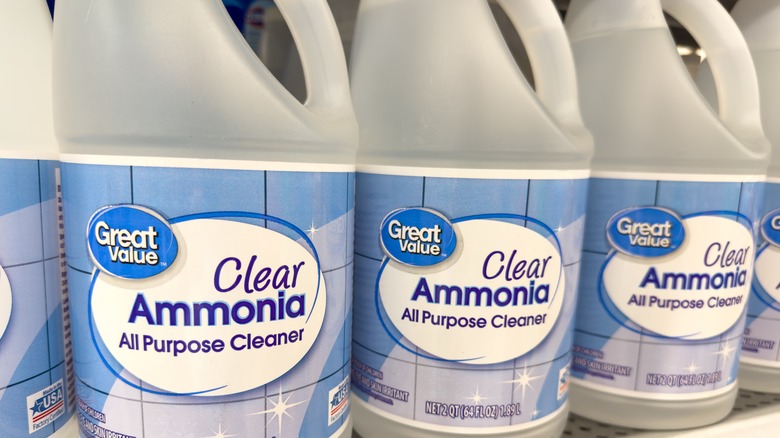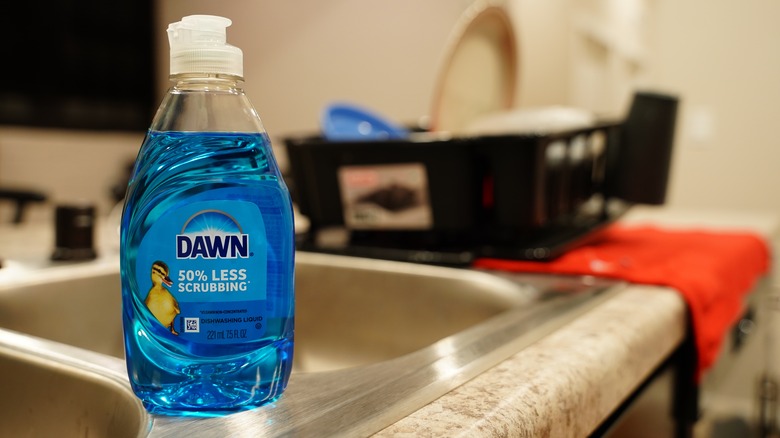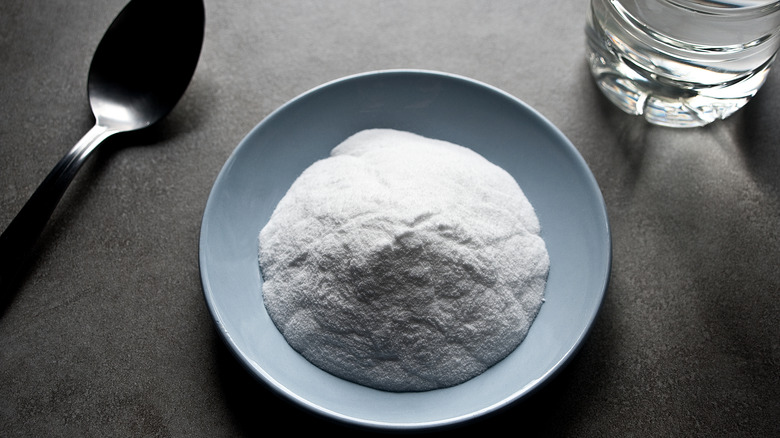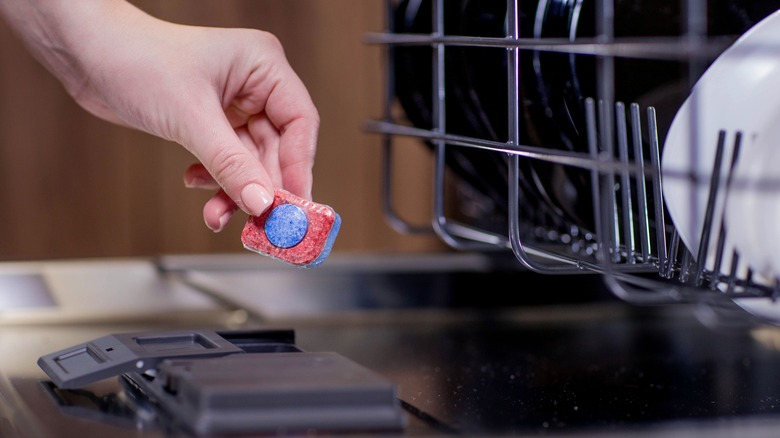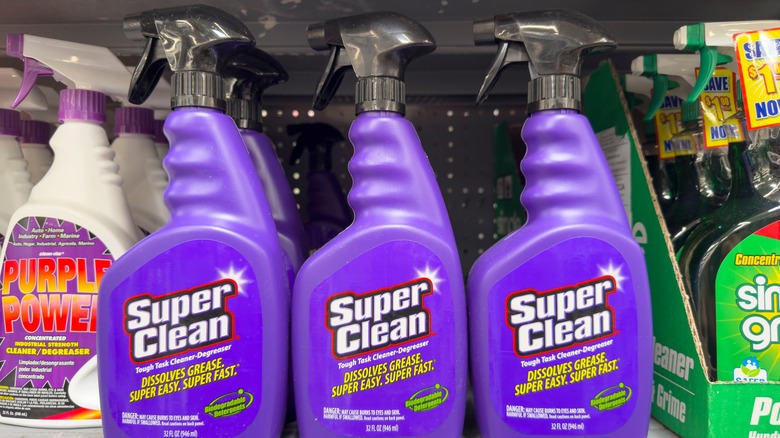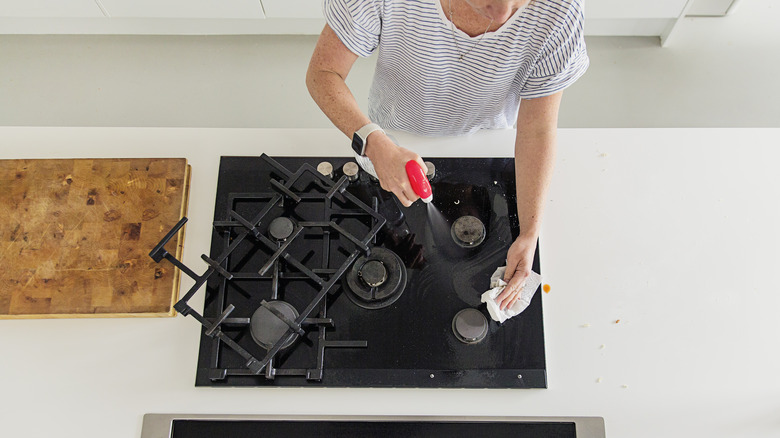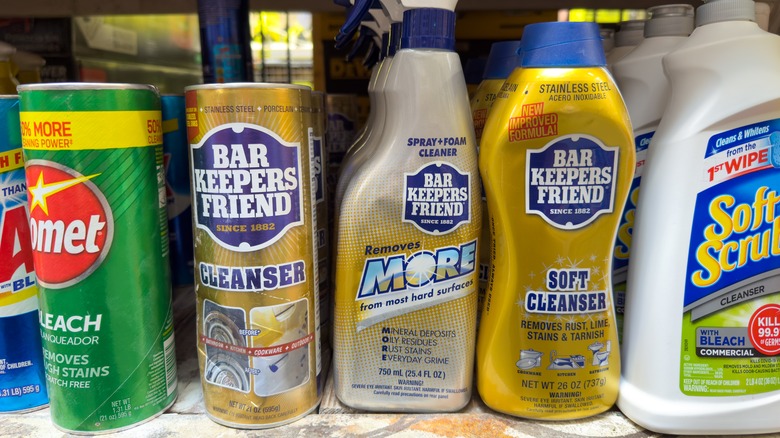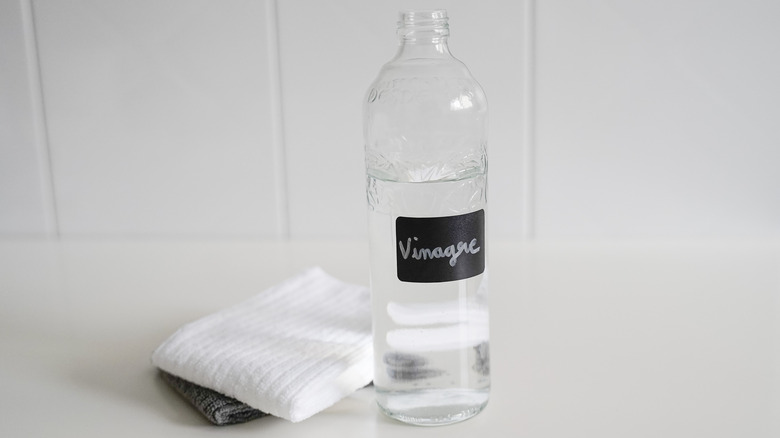The 8 Best Ways To Remove Grime From Gas Stove Grates For A Sparkling Finish
We may receive a commission on purchases made from links.
If you spend a lot of time in the kitchen, you know just how quickly your beloved stove can go from clean to crusty. Between burnt-on food and splashes of grease, the grates on your gas stove can become a place where grime and gunk can easily build up. Built-up grime can make your stove less effective and can become a fire hazard. While you may not be able to completely prevent your stove grates from getting dirty, there are plenty of things you can do to make sure they don't stay that way.
From baking soda to ammonia, you might already have everything you need to give your grates a good clean. Keep reading to learn about some of the best ways to remove grime from your gas stove grates. With the help of the hacks on this list, you can help ensure that your kitchen is a clean and comfortable place to prepare your and your loved ones' favorite dishes.
Ammonia and a plastic bag can save the day
Stove grates probably aren't the first things that come to mind when people think of the things they can clean with ammonia. However, this popular household cleaner offers a fairly easy method to keep your stove grates looking their best. Ammonia's chemical makeup allows it to cut through the grease left behind from common cooking oils such as vegetable oil. "Ammonia is basic and usually removes relatively more acidic hydrogen atoms from grease [fatty acid] and makes them negatively charged and more soluble in water," Metin Karayilan, PhD, an assistant professor of chemistry at Case Western Reserve University, told Reader's Digest.
Simply place each of your dirty stove grates into its own plastic bag. Zipper-top bags are a good choice here, since they seal the grates and ammonia inside, which is important since both the liquid ammonia and the ammonia gases work to break up stove grate grime. Pour between ¼ and ½ cup of ammonia into the bags and seal them tightly. Let the bags sit overnight, and rinse them with warm water in the morning. Although this method isn't the quickest, some may find that it is an ideal option because, in most cases, the grates won't need to be scrubbed. It's important to note that this method works especially well with cast iron grates.
Dish soap can help you say goodbye to grime
Dirty dishes aren't the only things in your kitchen that can benefit from a few pumps of dish soap. It can also get your dirty stove grates clean again. That's because of the surfactants, which are the molecules in the dish detergent that work to break the grease down and separate it from the surface of the grates. They're unique in that they're both attracted to and repelled by water. They have a hydrophilic (water-attracting) head and a hydrophobic (water-repelling) tail. The head attaches to water while the tail embeds itself into the grease, helping to break down the fat into smaller droplets and washing it away with the H2O.
First, remove the grates from your stove and let them soak in warm water and dish soap for about 15 to 20 minutes. This should help get rid of stubborn grime that has caked itself onto your grates. Once you've soaked them, you'll want to scrub them to remove any excess grease and grime. This method can be used on a variety of grate materials, but it is important to note that scrubbing with an abrasive utensil could scratch cast iron stove grates.
Baking soda and water are a dynamic duo
Baking soda is something you might already have lying around your house, and you may even be aware that there are things in your home you can clean with it. But did you know that your gas stove grates were yet another thing you could add to the list? That's right, with just water and baking soda, you can create a concoction that can help give your grates a nice sparkly finish. All you need to do is make a paste by mixing water and baking soda. This works because baking soda's alkaline base helps break up the fatty acids in grease, effectively neutralizing them and making them easier to wipe away. Additionally, baking soda can also act as a mild abrasive.
For this method, experts suggest using 1 part water and 3 parts baking soda. Next, coat your grates with the paste and let them sit for between 15 and 30 minutes. After letting your grates sit, scrub them to get rid of any stubborn grime that may still be stuck to your grates. Once you've scrubbed them clean, rinse them in warm water before drying and placing them back on your stove. Even though this method can be very effective, if your grates are particularly greasy, you may want to consider an alternative option, such as using ammonia.
Your dishwasher just got even more useful
If you've ever wondered whether or not it's safe for you to clean your stove grates in the dishwasher, the answer is yes. In fact, your dishwasher could completely transform your grate cleaning routine by making it easier than you've ever imagined. After removing the grates from your stove, scrub them with water and soap to remove particles and grime.
Once you've scrubbed your grates, Maytag suggests putting them in the bottom rack of your dishwasher and selecting the deepest cleaning cycle your machine offers. If your grates aren't too dirty, you may not need to scrub them before putting them in the dishwasher. Once the cycle is complete, allow your grates to dry completely before placing them back on your stove. Many people will be happy to know that dishwashers are safe for most stove grates. However, before trying this method, it's important to review the owner's manual for your stove to determine whether or not your grates are dishwasher safe.
Degreasing products can be great for grime
You may already be using degreasing products in other areas of your kitchen like the vent hood, but did you know that they can also be useful for cleaning gas stove grates? Degreasers contain surfactants or solvents that break down fatty acids. They're different from soap and all-purpose cleaners in that they're specially formulated to target organic soils like fat and oil, so their solution is more alkaline and abrasive. Although there are lots of different degreasing solutions on the market, Dawn Professional Heavy-Duty Degreaser is recommended by house cleaning experts.
Remove your grates and spray them with the degreasing solution. Let them sit for about 15 minutes before wiping them down, rinsing them off, and letting them dry. This method may work best for light cleanings instead of deep cleanings. If you're unable to clean your grates on a regular basis, this option may not be best for you. Ashley Poskin of The Kitchn tested degreasers on enamel stove grates and noted that, while it was great for surface stains, the Dawn solution didn't seem to work well on tough grease build-up, even after letting the degreaser sit on the grates for double the time and repeating the process.
Oven cleaner can work on stove grates too
Oven cleaner is something you may have never thought to use outside of what its name suggests. However, that won't be the case for much longer. Oven cleaner can actually be a great way to clean your stove grates as well. Since it's specifically formulated to target built-up grease, the formula is highly alkaline, helping neutralize stubborn fats quickly and easily.
Before you use oven cleaner on your stove grates, you should remove the grates and let them soak overnight in warm water and soap. Scrub the grates the next morning and wipe them dry. Next, spray the grates with a commercial oven cleaner. It is recommended that you put the grates on top of something like paper towels before spraying them. Once the grates are covered in oven cleaner, place them in plastic bags and let them sit overnight. The following morning, you can remove the grates from the bags, wipe them down, and rinse them off. If they are cleaned to your satisfaction, you can dry them and place them back on the stove. Since the chemicals in oven cleaners can be toxic, this should only be done in a well-ventilated area.
Bar Keepers Friend to the rescue
Bar Keepers Friend is a popular cleaning product that has been around for more than 100 years. The product's main ingredient is oxalic acid, a naturally occurring compound found in vegetables like spinach that can dissolve rust and mineral deposits. When oxalic acid comes into contact with these buildups, a chemical reaction happens that turns them into salt, allowing the water to easily wash them away. However, since oxalic acid is, well, acidic, and grease is acidic, the powdered stuff wouldn't be able to help since they won't neutralize each other (unless you just use it for its abrasive texture.) Instead, you can use the brand's grease-busting powder, BKF Cookware Cleanser & Polish. This was formulated with 50% more detergents than its other cleaners, helping tackle stubborn messes.
To put this method to the test, remove your grates and cover them with Bar Keepers Friend. Instead of applying the product directly on your grates, you can also create a paste made from Bar Keepers Friend and water and use that to coat your grates. No matter which way you decide to go, scrub your grates after applying it to get rid of the build-up that's accumulated. Since Bar Keepers Friend is mildly abrasive, people with cast iron grates may not want to use it. However, one of the great things about this product is that it can be used to clean other parts of your stove and other areas of your kitchen.
Vinegar can help tackle light messes
Vinegar may not have the most pleasant smell, but that doesn't mean that you should write it off as a great cleaning solution. The acetic acid in vinegar could help break down the fatty acids in grease, making them easier to wash away. However, this is best used for lightly soiled grates. Using an acid to break down another acid isn't the most efficient method — instead, you want to use an alkaline, like ammonia or baking soda. But if you have vinegar handy and only have slight grease residue on your grates that need cleaning, this can work in a pinch. (Side note: You can make vinegar more effective at removing fats and oils if you include heat, so opt to use hot water in your mix. This will not only soften the grease, making it easier to penetrate, but will accelerate the chemical reaction between the two acids, helping break it down faster.)
Create a solution using equal parts hot water and vinegar, and then pour it into a spray bottle. Spray the solution on all of your stove grates and let it sit on them for around 30 minutes. If you don't have a spray bottle available, you can soak your grates in the solution instead.
